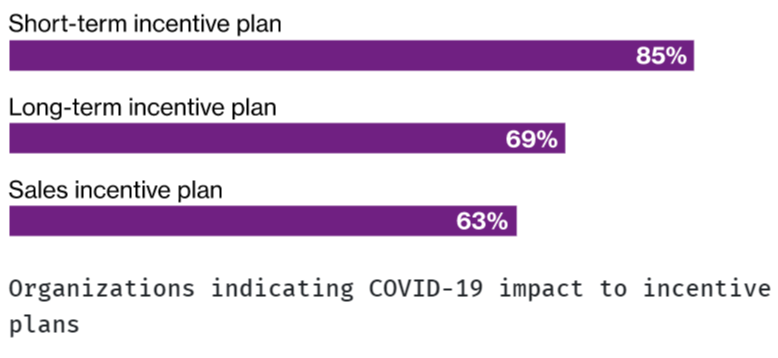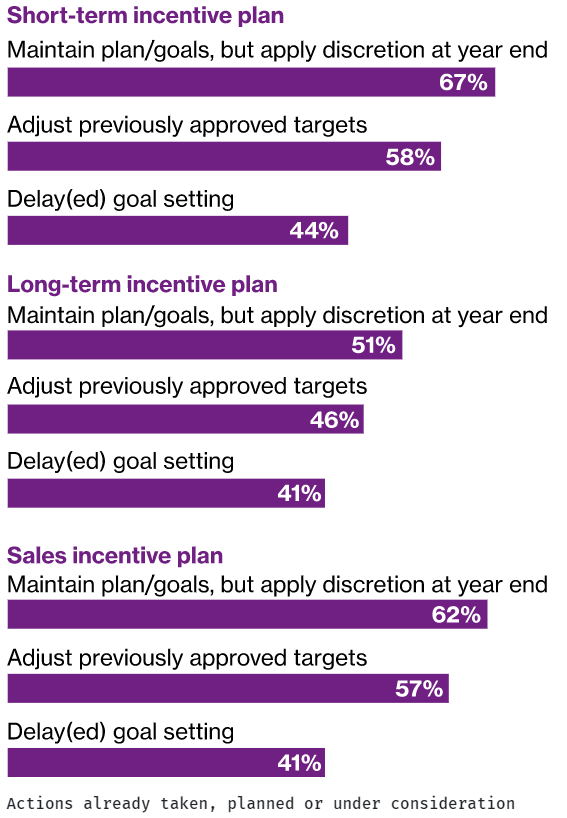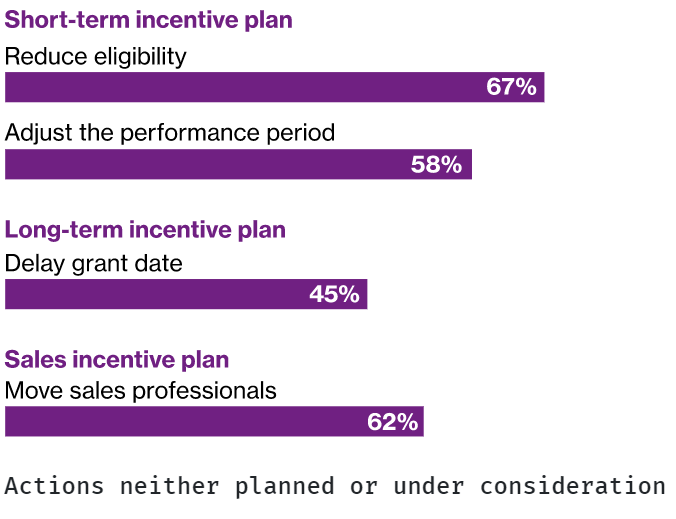As the COVID-19 crisis escalates, we revisited a question we asked in February about incentive plans and sales compensation.
As we settle into the “new normal” of social distancing and stay-at-home campaigns stemming from the COVID-19 (coronavirus) pandemic, organizations continue to focus on their human capital especially the safety, health and wellbeing of their employees. As the crisis escalates, we decided to revisit a question we asked in February about incentive plans and sales compensation.
Our March survey series found that employers developed policies with respect to pay and benefit continuation for hourly employees affected by the pandemic.
With the economic challenges evolving, organizations must also grapple with how to effectively manage risks to the business (e.g., essential versus non-essential government designations, temporary store/site closures, disrupted supply chains, shifts in consumer demand, etc.). Against this backdrop it remains as important as ever to effectively and fairly motivate and reward employees. In such unprecedented times, many companies are asking:
- How do we do that?
- What is fair and appropriate?
- What are others doing?
Our first pulse survey about COVID-19’s impact on incentive plans in late February had 200 North American respondents. When we revisited the topic a month later to better understand how sentiment has changed, 775 organizations responded.
The majority of participating organizations anticipate a negative impact on business results over the next six to twelve months, with uncertainty beyond this point given the number of unknowns. Similarly, the majority of responding organizations indicate a negative impact to their short-term incentive plan (85%), performance-based long-term incentive plan (69%; among those operating one), and sales incentive plan (63%; among those with applicable plans).

However, many of these organizations do not intend to make changes to these programs at this time. Actions and/or design changes are much more likely to be observed for short-term incentive plans (43%) than performance-based long-term incentive plans (15%) or sales incentive plans (20%). Of organizations reporting an impact and an intent to respond to it, most are maintaining existing goals but plan to apply discretion at the end of the performance period, have or will adjust previously approved target goals, or have or will delay goal setting until a later date. For sales incentive plans, adjustments to goals or discretionary adjustments are the most prevalent.

Other actions and design changes were observed with less prevalence, including changing metrics, lowering threshold performance levels, and delaying equity grant dates. This is influenced in part by the timing of an organization’s financial year-end and the point at which plans, goals and awards for the year were due to be approved.
Conversely, the results of the survey also provided insights into actions or design changes organizations are largely not taking, planning or considering currently. These include reducing eligibility or adjusting performance periods (short-term and long-term incentives) or moving sales professionals to corporate plans.

COVID-19 was declared a pandemic by the World Health Organization on March 11, less than one month ago. While non-incentive compensation and benefits for the workforce requires more immediate action, we encourage organizations to take a long-term, holistic view with respect to their incentives. It will also be important to contextualize any potential changes in light of actions that are impacting your stakeholders, including the broader workforce (e.g. pay reductions, furloughs) and shareholders (e.g. reduced dividends, depressed stock prices).
Willis Towers Watson will continue to monitor the market as the health, business and economic impacts of COVID-19 continue to develop.
Should you wish to discuss strategies your organization is considering or wish to participate in future Willis Towers Watson surveys, please reach out to your Willis Towers Watson consultant or send an email to surveys@willistowerswatson.com so that we may direct you to the appropriate person.
Authors:
 Heather Marshall - Senior Director, Executive Compensation (New York)
Heather Marshall - Senior Director, Executive Compensation (New York)
 Derek Mordente - Director, Executive Compensation (New York)
Derek Mordente - Director, Executive Compensation (New York)
This blog originally appeared here on the Willis Towers Watson website, April 6, 2020.


